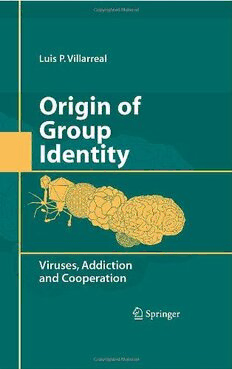Download Origin of Group Identity: Viruses, Addiction and Cooperation PDF Free - Full Version
Download Origin of Group Identity: Viruses, Addiction and Cooperation by Luis P. Villarreal (auth.) in PDF format completely FREE. No registration required, no payment needed. Get instant access to this valuable resource on PDFdrive.to!
About Origin of Group Identity: Viruses, Addiction and Cooperation
From bacteria to humans, all life has ways to recognize themselves and differentiate themselves from similar life forms. The ability to recognize similarity can be called group identity or group membership and also relates to group cooperation. Even viruses have the capacity for group identity and cooperation. However, those viruses that stably colonize bacteria can directly affect the group identity of their host. Starting with this virus-host relationship, this book traces the origin and evolution of group identity. By examining the stable, extrachromosomal viruses of bacteria, a strategy has been defined that is used for both virus persistence and group identity; this is the addiction module of phage P1. Thus, this book examines how genetic parasites and addiction modules have been involved in the origin of toxins/antitoxins modules as systems of group identity and immunity. The origin of sensory systems for light and small molecule (pheromone) detection and production, social motility, and programmed cell death are all examined. From the emergence of worms with brains, to vertebrate fish, to insects and tetrapods, olfaction and pheromones were maintained for group identity purposes and linked to addictive social bonding. In the African primates and humans, however, a great colonization by genetic parasites mostly destroyed this pheromone based system of social identity. This compelled primates to evolve enlarged social brains that used vision to learn group identity. Humans additionally evolved an even larger social brain and also developed a mind able to learned language and beliefs to specify group identity.
Detailed Information
| Author: | Luis P. Villarreal (auth.) |
|---|---|
| Publication Year: | 2009 |
| ISBN: | 9780387779980 |
| Pages: | 632 |
| Language: | English |
| File Size: | 5.085 |
| Format: | |
| Price: | FREE |
Safe & Secure Download - No registration required
Why Choose PDFdrive for Your Free Origin of Group Identity: Viruses, Addiction and Cooperation Download?
- 100% Free: No hidden fees or subscriptions required for one book every day.
- No Registration: Immediate access is available without creating accounts for one book every day.
- Safe and Secure: Clean downloads without malware or viruses
- Multiple Formats: PDF, MOBI, Mpub,... optimized for all devices
- Educational Resource: Supporting knowledge sharing and learning
Frequently Asked Questions
Is it really free to download Origin of Group Identity: Viruses, Addiction and Cooperation PDF?
Yes, on https://PDFdrive.to you can download Origin of Group Identity: Viruses, Addiction and Cooperation by Luis P. Villarreal (auth.) completely free. We don't require any payment, subscription, or registration to access this PDF file. For 3 books every day.
How can I read Origin of Group Identity: Viruses, Addiction and Cooperation on my mobile device?
After downloading Origin of Group Identity: Viruses, Addiction and Cooperation PDF, you can open it with any PDF reader app on your phone or tablet. We recommend using Adobe Acrobat Reader, Apple Books, or Google Play Books for the best reading experience.
Is this the full version of Origin of Group Identity: Viruses, Addiction and Cooperation?
Yes, this is the complete PDF version of Origin of Group Identity: Viruses, Addiction and Cooperation by Luis P. Villarreal (auth.). You will be able to read the entire content as in the printed version without missing any pages.
Is it legal to download Origin of Group Identity: Viruses, Addiction and Cooperation PDF for free?
https://PDFdrive.to provides links to free educational resources available online. We do not store any files on our servers. Please be aware of copyright laws in your country before downloading.
The materials shared are intended for research, educational, and personal use in accordance with fair use principles.

